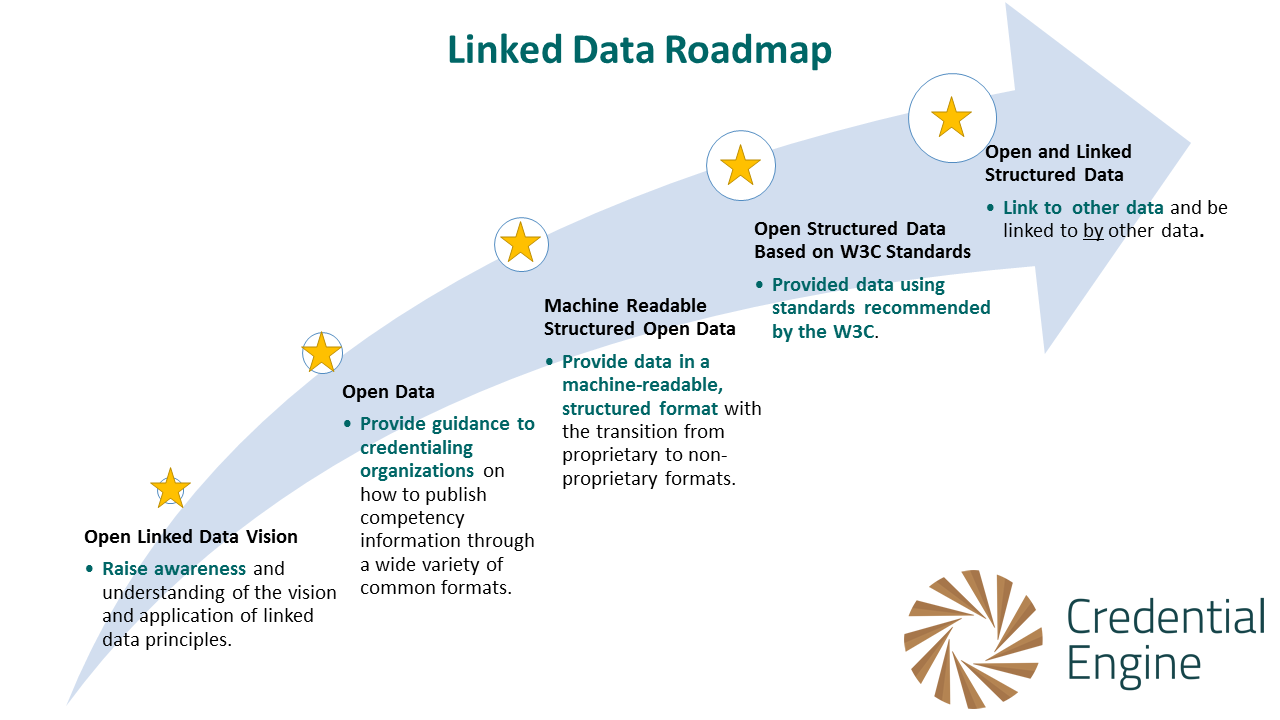Introduction
Many efforts are going on now across organized groups to tackle challenges that are currently barriers to realizing open, interoperable data models and schemas for credentials and competencies. The Credential Engine Technical Advisory Group (TAG) promotes collaboration and harmonization of standardization initiatives, including identification of opportunities to formalize and document open models, vocabularies, and schemas. The TAG consists of over 25 members and is staffed by Credential Engine staff and consultants. The members represent:
- Content Experts from the major types of credentials (e.g., universities, colleges, certification organizations) and market segments (e.g., manufacturing, healthcare) in the credentialing marketplace. They also represent related domains, such as content experts with experience in developing and using the full range of competency information from different information models and formats.
- Web Technology and Data System Experts with experience in the application of Linked Data principles in the credentialing and related domains.
TAG Membership and Meeting Format
The listing of Technical Advisory Group members is maintained along with the four additional Credential Engine Advisory Groups on the Credential Engine website. The TAG continues to invite and encourage new membership. Technical and content experts can submit a request to join the TAG.
The TAG meets periodically (no more than once a month) to discuss one or more major topics, such as those listed below, via a live webinar and smaller groups are formed to review specific proposals as needed. The small groups typically meet 2 - 4 times via live webinar. Materials, information, and discussion are via Google Drive and Groups. Issues are documented and commented on via GitHub.
- Major updates to the CTDL and other schemas
- Major updates to the development of Credential Engine systems and/or the Credential Registry
- Major updates to policy
- Other major initiatives and formation of task groups
Mission and Work Plan
The TAG promotes collaboration and harmonization across initiatives that are developing data models, vocabularies, and schemas related to the major credential properties (descriptors) based on the principles of Linked Data. These collaboration and harmonization efforts focus on the credential domain as well as related domains for each credential descriptor. These related domains are most critical to addressing the functional requirements of four major applications and achieving the Credential Engine goals of improving transparency and coherence in the credentialing marketplace. These related domains include, but are not limited to:
- Employer Human Resource Information Systems (HRIS)
- Transcript, Portfolio and Resume Systems
- Student Information Systems
- Labor Market Information Systems
- Learning Systems and Resources
The Group is not a W3C or ANSI standards committee but follows similar tenants such as transparency and consensus. All group members have input to impact the metadata infrastructure, the Credential Registry and Directory app design, and pilot.
The metadata recommendations are guided by Stuart Sutton, DCMI Managing Director, and Associate Professor Emeritus, Information School, University of Washington. Final decisions on the metadata recommendations are made by the Credential Engine leadership.
Using W3C Linked Data Principles and 5-Star Linked Data Rating System
The TAG conducts its work based on the W3C Linked Data specifications and best practices guiding principles and 5-Star Rating System for realizing the vision of open linked data to improve transparency and coherence in the credentialing marketplace. The guiding principles are:
- Uniform Resource Identifiers (URI) - Provide clear and globally unique identifiers as names for all data and metadata resources on the web that are relevant to the credentialing marketplace.
- HTTP URIs - Use HTTP protocols with these names so that people can look up these names and know who is the originator and authoritative sources of these resources.
- Data and Metadata Documentation - Provide clear guidance on data structures and metadata vocabularies so people can make the most effective use of the resources.
- Linking Resources - Provide links to other related resources on the web so people can discover further information and improve the potential power of the global web of data.
The TAG considers the following general roadmap based on these benchmarks, as well as related benchmarks, for open data:
- Open Linked Data Vision - Raise awareness and understanding of the vision and application of linked data principles and how to move toward that vision in the credentialing marketplace.
- Open Data - Data is made available on the web through an organization’s website.
- Machine-Readable Structured Open Data - Open data is provided in a machine-readable and structured format with the transition from proprietary (e.g., Excel spreadsheets) to non-proprietary formats.
- Open Structured Data Based on W3C Standards - Open data is provided using the open linked data standards recommended by the W3C (e.g., RDF/RDFS/OWL).
- Open and Linked Structured Data Based on W3C Standards - Open data is provided using the W3C standards and links are provided to other data.
The group also reviews related Linked Data benchmarks for enhancing this roadmap, including benchmarks for data quality, provenance, and vocabulary use. This approach is being used to develop the personalized roadmap guides for pilot-site organizations based on where they are at now in moving toward Linked Data.




